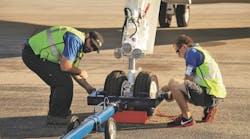MADISON, Wis. (AP) -- The state Supreme Court agreed to hear a lawsuit challenging the constitutionality of a property tax exemption designed to benefit Midwest Airlines and Air Wisconsin, the only two airlines based in the state.
A Dane County judge struck down the exemption two years ago after Northwest Airlines sued, ruling the Minnesota-based company should not have to pay the taxes if the other two do not.
The 4th District Court of Appeals asked the Supreme Court earlier this year to take up the case directly. In its request, the appeals court noted the lawsuit could have far-reaching implications for Wisconsin's ability to provide incentives for businesses to locate, upgrade and remain in the state.
The appeals court said a decision could affect the state's ability to compete with others to attract businesses by impacting other tax incentives lawmakers can create for firms doing business in Wisconsin.
Lawmakers did not specifically name Midwest or Air Wisconsin in the 2001 legislation, which created a property tax exemption for airlines that operate ''hub facilities'' in Wisconsin. But those airlines were the only ones that met the standard.
The property tax breaks amounted to about $2.5 million annually for the two airlines.
Northwest contended it should not have to pay about $1.6 million in property taxes a year for its Wisconsin operations because of the exemptions for Oak Creek-based Midwest Airlines and Appleton-based Air Wisconsin.
A Dane County judge agreed, ruling the tax exemption violated the Commerce Clause of the U.S. Constitution. That clause gives Congress the power to regulate commerce among states. But it also limits the power of the states to ''discriminate against interstate commerce.''
Midwest Airlines officials have said the outcome of the case could factor into the company's growth plans.




